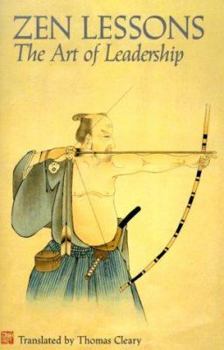Zen Lessons
Select Format
Select Condition 
Book Overview
This guide to enlightened conduct for people in positions of authority is based on the teachings of several great Chinese Zen masters. Drawing on private records, letters, and long-lost documents of... This description may be from another edition of this product.
Format:Paperback
Language:English
ISBN:0877734461
ISBN13:9780877734468
Release Date:February 1989
Publisher:Shambhala Publications
Length:138 Pages
Weight:0.18 lbs.
Dimensions:0.5" x 5.5" x 8.5"
Related Subjects
Buddhism Business Business & Investing Economics Philosophy Religion Religion & SpiritualityCustomer Reviews
4 ratings
Great book
Published by Thriftbooks.com User , 15 years ago
Great tips for the modern leader. The zen wisdom of the 8th - 10th centuries is beautifully taught. Through the ancient teachings, an appraisal method of today's leaders is developed. If the reader stays with it and reads the whole book the true zen of leadership is disclosed.
Who Leads?
Published by Thriftbooks.com User , 19 years ago
In light of the morally destitute state of leadership in this country, the title of this book arouses a cynical chuckle at first. In such a context, hunger for the genuine leader is palpable. The broken trust we have all experienced at the hands of "leaders"--whether political, economic, social or religious--has sparked a multifaceted reactivity. It manifests itself as both atheism and pantheism, new age spiritualism or traditionalism. Given the septicity of the western Zeitgeist, it is inevitable that there will be those who suspect that the western practioner of Buddhism is engaged in a feverish and delusional attempt to manufacture the genuine out of an exotic orthodoxy whose best selling point is that it is not really a religion. Like any religion it has succeeded in drawing its share of phonies and egomaniacs. These "Zen Lessons" are a useful guide in identifying, illustrating and rebuking them. In the eleventh century China at the time of the Song Dynasty, when the writings that comprise Zen Lessons were composed Chan (Zen) had reached a zenith of popularity and influence. Monasteries had taken on a prestigious civic aspect, and it had become the custom for a government official to make appointments of leadership in the monastic hierarchy. The system was easy to game: imposters proliferated, and their flatteries and pieties got them into plum roles in the monasteries. Thomas Cleary has this explanation for the vast expansion of Zen and its inevitable corruption: "According to Zen teaching, when people in positions of great responsibility in society trust Zen adepts, it may be...an unconscious response to the safety felt in the presence of a truly detoxified human being...the false appeared in such profusion precisely because the true was so effective." In Zen Lessons The Art of Leadership, a range of Zen masters comment on sundry slippages from the Noble Eightfold Path. Start reading this book anywhere and you'll find a trenchant homily, relevant to contemporary practice, or an earthy, dishy slice of life. "People nowadays are lazy about getting up, and many are deficient in manners when they congregate. Some indulge shamelessly in their appetite for food, some create disputes in their concern for getting support and honor." Or you come across the sublime: "An iron dyke a thousand miles long leaks through anthills. The beauty of white jade is lost in a flaw. The supremely subtle Way is beyond iron dykes and white jade, yet greed and resentment are greater than anthills and flaws." Through Cleary's able and accessible prose, there emerges a portrait of a Zen clergy notable for its plain and forthright speech, tough but intelligent, men who despise artifice and revere humility, learning, and wisdom. Such a book will hopefully find as wide an audience as The Art of War, which Cleary also translated, and insinuate its enlightened morality into the decadent fiber of post industrial capitalism. It belongs in
Of Destiny and Dynasty...
Published by Thriftbooks.com User , 23 years ago
...this is a two inch paperback book with 216 anecdotes, precepts and lessons from various Zen teachers of the Song Dynasty in China. Some interesting history and discussion appears in the 30-odd pages of the Translator's Introduction at the beginning of the book...Thomas Clary says of this period that Zen was "characterized by complexity of form and ingenious imagery with multiple meaning" and so, one finds many ambiguities in the lessons. And also there's much discussion on what the nature of Zen (Tang vs Song Dynasties) and what the way of the Sages should be. That should not, however, stop the modern day student (whether in business, politics or some other leadership position) from seeking some of the lessons offered in the book. In fact, Clary also translated Sun Tzu's "The Art of War", most recently found in corporate bookshelves.
Review of "Zen Lessons: The Art of Leadership"
Published by Thriftbooks.com User , 25 years ago
It is said that there is nothing new under the sun. Certainly the issues facing leaders today are comparable to those that have faced leaders across cultures and throughout time. Human nature has not changed, and therefore the fundamentals of leadership -- the process of channeling human nature in a particular direction -- have not changed."Zen Lessons: The Art of Leadership" conveys this message in spades. In the format of a series of compact passages, it presents excerpts from the cumulative wisdom of thousands of years of experience with continual political society. The insights and lessons contained in this book are as poignant today as they were when they were first put forth; the reader will be astounded, gratified, and ideally energized to pursue a path of virtuous leadership in his or her personal and professional life.This reviewer highly recommends this book for those in corporate, governmental, public or private positions of leadership, as! well as for the general reader. After all, it is the duty of the citizenry to expect great things from those it follows.




